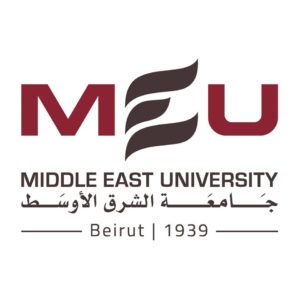MEU was pleased to be one of the sponsors for the high-level economic forum Lebanon 2025 on Friday, June 3, 2016. Hosted at the Hilton Habtoor, over 200 guests attended an all-day event featuring experts in the areas of innovation, commerce, capital markets, the global financial market, the digital economy, marketing communications, public financial management, telecommunications, financial crime risk, financial market strategy, and technology. The forum was created to discuss the most significant challenges the Lebanese economy and society may encounter over the next ten years. It addressed ways of collaboration among the government, education sector, and various industries.
Tim Jones, of Future Agenda based in the United Kingdom, opened the session by sharing views of what people think the world will be like in 2025. He talked to 5,000 people in 45 countries in 2015 to try to understand and share as many views as possible. After looking at problems that we haven’t solved yet, such as urban obesity, plastic oceans, citizen-centric cities, and digital money, he noted questions that the world is asking about the Middle East, such as oil price dependency and youth unemployment. Jones also presented potential opportunities for Lebanon such as the financial services growth, female leadership, becoming a regional centre of learning, and having a creative economy.
The following sessions considered how to redesign the economic sectors, knowledge economy and innovation, monetary and public policies, and capital markets and security risk. The material was educational, relevant to current issues, and helpful to stimulate further discussion as was evident during the lively Q&A sessions. Education, innovation and the economy were highlighted by 18 speakers and moderators. For example, Mr. Fady Abboud predicted that software will disrupt most traditional industries in the next 5-10 years and the future depends on us being able to understand what will happen to us. Dr. Ghassan Hasbani noted it would be best to adopt a digital economy to increase the economy, impact job creation, and enhance learning. He proposed that digital skills and e-literacy are vital to the economy as by 2025 8-year olds will need to know how to program simple applications. Mr. Omar Nasreddine focused on how the power of ideas drive change as we change the way people think which changes the way they act towards the product. Ideas create relationships, creating an ideology, as the economy is not just facts and figures but is strongly related to emotions such as national pride, integrity, and transparency. Mr. Mounir Rached recommended a more balanced tax structure with strong income tax and to restructure revenue and expenditure tax reform. He proposed the power sector be a focus of reform as it can be done in a short time at no extra cost, then savings can be reallocated to infrastructure, education and health. Mr. Meguerditch Bouldoukian noted that while cybercrime is on the rise, the new bank robbery, less than 40% of banks surveyed in 2016 had programs in place to fight it. Firas Saffieddine recommended switching to a market-led system rather than bank-led, as Lebanon is purely bank-led. This change will help reduce the debt in relation to the GDP and protect the investor by creating a regulatory system.
MEU was privileged to have the opportunity to increase awareness of the university in the business professional community. We facilitated registration, had an informational stand, and our logo was featured prominently on the program and backdrops. In addition, events such as these allow our students to interact with professionals in their area of study.






